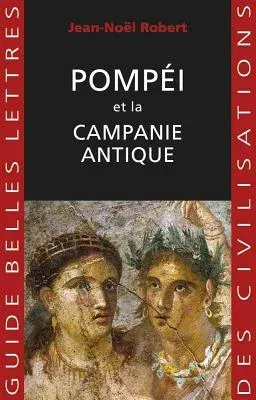English summary: Each guide in Les Belles Lettres' "Civilisations"
collection presents a civilisation from the vantage point of its mindset
and behavioural history; i.e., each strives to explore the various
aspects of the depicted civilisation through the perspective and
judgement criteria - so unlike our own - of the era's inhabitants.
Adopting this viewpoint is essential in order to "fathom" the cities of
Pompeii and Campania. The traditional image which comes to mind is that
of small towns in which people enjoyed a pleasant and peaceful existence
in the tranquil opulence of a heavenly landscape. Yet life there was
nothing like that in the final years preceding the eruption of Mount
Vesuvius. First of all, in AD 62, Pompeii had endured a violent
earthquake which had destroyed most of the city. Its inhabitants were
thus living among ruins, rubble and partially reconstructed buildings.
Poverty, misery and slavery were rampant. Obviously, people today who
visit the cities' luxurious dwellings, with their multicoloured frescos
creating a world of beauty, will say that their owners were scarcely to
be pitied. And yet, these houses were dark and cold, and the promiscuity
of dozens, if not hundreds, of slaves prohibited any degree of intimacy.
Not to mention that the streets were always crowded, noisy, and littered
with garbage and sundry excrement. Yes, Pompeii stunk! So it would seem
that we need to reconsider all our preconceptions - even those which
history has handed down to us. No, the volcano did not erupt on 24
August of AD 79, as all pupils have been taught. In-depth research
compels us to acknowledge that it happened two or three months later.
This work therefore invites us to experience a rediscovery. It completes
the book devoted to Rome in two ways: first, it was in Campania - site
of the first Greek colonisation in Italy - that the development of Roman
civilisation began. Next, the sole benefit of the volcano's eruption was
that its deadly path preserved elements of the inhabitants' daily lives
better than in any other site. This book offers us a glimpse into the
ways in which a small Roman Empire city functioned, while raising all
the questions that always come up in a search for the truth. Readers
will thus have an opportunity to participate in a full-fledged treasure
hunt whose solutions can only be found in history, archaeology and
researchers' discoveries. French description: La Campanie, heureux
sejour des dieux et des muses abandonne aux puissances infernales. Une
terre de culture, une terre de sang mele, aux sources de la civilisation
romaine. En 79 de notre ere, l'explosion du Vesuve a couvert d'un
linceul de cendres cet ecrin de nature lumineux et tranquille. A Pompei,
ou le temps fut suspendu, le voyageur croit tout comprendre de la vie
des Anciens.Mais pense-t-il a se garder des illusions ? Ce guide
l'invite a relire le quotidien de ces cites retrouvees.

